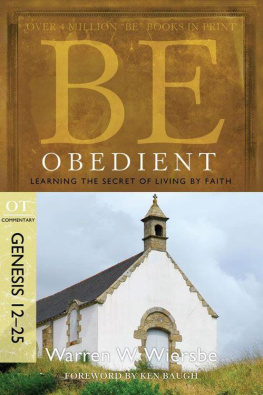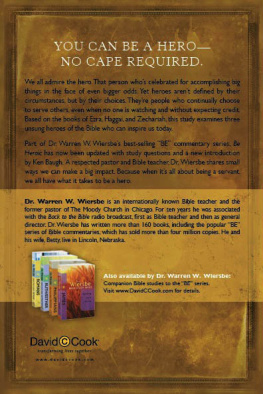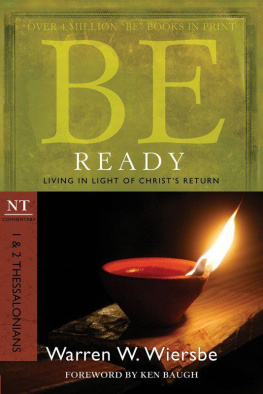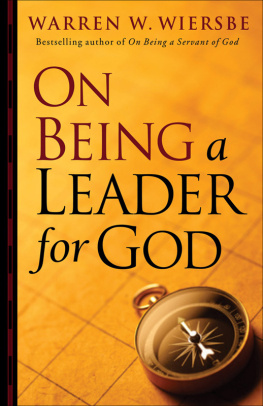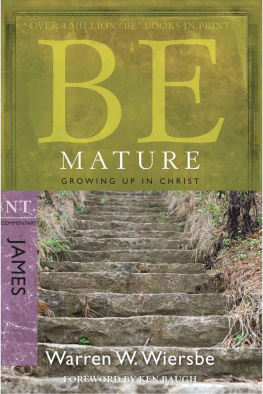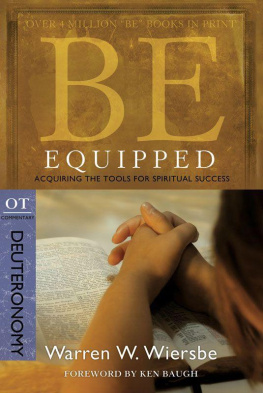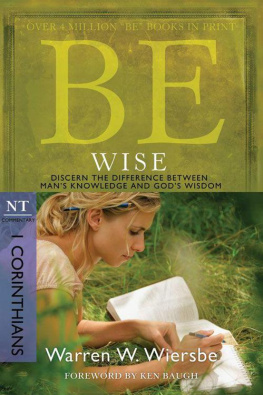
Contents
Introduction to Mark
Meeting Needs
The gospel of Mark is just the book for busy people who want to use every opportunity to serve God. It presents our Lord on the move, meeting the physical and spiritual needs of all kinds of people. Mark depicts Jesus as Gods suffering Servant who came, not to be ministered to, but to ministereven to the extent of giving His life for us on the cross.
Our world is filled with hurting people who need our ministry. Jesus left His church on earth so that we might continue the ministry He started. However, I fear that in the church today, we have too many spectators and not enough participants, too many celebrities and not enough servants.
The Servant
Mark wrote for the Romans, and ultimately for all of us, and his theme is Jesus Christ the Servant . If we had to pick a key verse in this gospel, it would be Mark 10:45: For even the Son of Man did not come to be served, but to serve, and to give his life as a ransom for many.
If our time together studying Marks gospel encourages you to be diligent in your own ministry to others, then the time has not been wasted. May our Lord enable all of us to be servants for His glory!
Warren W. Wiersbe
How to Use This Study
This study is designed for both individual and small-group use. Weve divided it into eight lessonseach references one or more chapters in Warren W. Wiersbes commentary Be Diligent (second edition, David C Cook, 2010). While reading Be Diligent is not a prerequisite for going through this study, the additional insights and background Wiersbe offers can greatly enhance your study experience.
The Getting Started questions at the beginning of each lesson offer you an opportunity to record your first thoughts and reactions to the study text. This is an important step in the study process as those first impressions often include clues about what it is your heart is longing to discover.
The bulk of the study is found in the Going Deeper questions. These dive into the Bible text and, along with helpful excerpts from Wiersbes commentary, help you examine not only the original context and meaning of the verses but also modern application.
Looking Inward narrows the focus down to your personal story. These intimate questions can be a bit uncomfortable at times, but dont shy away from honesty here. This is where you are asked to stand before the mirror of Gods Word and look closely at what you see. Its the place to take a good look at yourself in light of the lesson and search for ways in which you can grow in faith.
Going Forward is the place where you can commit to paper those things you want or need to do in order to better live out the discoveries you made in the Looking Inward section. Dont skip or skim through this. Take the time to really consider what practical steps you might take to move closer to Christ. Then share your thoughts with a trusted friend who can act as an encourager and accountability partner.
Finally, there is a brief Seeking Help section to close the lesson. This is a reminder for you to invite God into your spiritual-growth process. If you choose to write out a prayer in this section, come back to it as you work through the lesson and continue to seek the Holy Spirits guidance as you discover Gods will for your life.
Tips for Small Groups
A small group is a dynamic thing. One week it might seem like a group of close-knit friends. The next it might seem more like a group of uncomfortable strangers. A small-group leaders role is to read these subtle changes and adjust the tone of the discussion accordingly.
Small groups need to be safe places for people to talk openly. It is through shared wrestling with difficult life issues that some of the greatest personal growth is discovered. But in order for the group to feel safe, participants need to know its okay not to share sometimes. Always invite honest disclosure, but never force someone to speak if he or she isnt comfortable doing so. (A savvy leader will follow up later with a group member who isnt comfortable sharing in a group setting to see if a one-on-one discussion is more appropriate.)
Have volunteers take turns reading excerpts from Scripture or from the commentary. The more each person is involved even in the mundane tasks, the more theyll feel comfortable opening up in more meaningful ways.
The leader should watch the clock and keep the discussion moving. Sometimes there may be more Going Deeper questions than your group can cover in your available time. If youve had a fruitful discussion, its okay to move on without finishing everything. And if you think the group is getting bogged down on a question or has taken off on a tangent, you can simply say, Lets go on to question 5. Be sure to save at least ten to fifteen minutes for the Going Forward questions.
Finally, soak your group meetings in prayerbefore you begin, during as needed, and always at the end of your time together.
Lesson 1
The Servant
(MARK 1)
Before you begin
Pray for the Holy Spirit to reveal truth and wisdom as you go through this lesson.
Read Mark 1. This lesson references chapter 1 in Be Diligent . It will be helpful for you to have your Bible and a copy of the commentary available as you work through this lesson.
Getting Started
From the Commentary
The gospel is neither a discussion nor a debate, said Dr. Paul S. Rees. It is an announcement!
Mark wasted no time giving that announcement, for it is found in the opening words of his book. Matthew, who wrote primarily for the Jews, opened his book with a genealogy. After all, he had to prove to his readers that Jesus Christ is indeed the rightful Heir to Davids throne.
Since Luke focused mainly on the sympathetic ministry of the Son of Man, he devoted the early chapters of his book to a record of the Saviors birth. Luke emphasized Christs humanity, for he knew that his Greek readers would identify with the perfect Babe who grew up to be the perfect Man.
Johns gospel begins with a statement about eternity. Why? Because John wrote to prove to the whole world that Jesus Christ of Nazareth is the Son of God (John 20:31). The subject of Johns gospel is the deity of Christ, but the object of his gospel is to encourage his readers to believe on this Savior and receive the gift of eternal life.
Be Diligent , page 17
1. Mark wrote his gospel for the Romans. How did the Romans differ from the audiences Matthew, Luke, and John intended to read their gospels? What announcement did Mark proclaim in his opening sentence? What key words stand out to you in that sentence that will likely be important later? The theme of Marks gospel is Jesus Christ the Servant. What sorts of readers would you expect to be interested in that theme?
More to Consider: Read Mark 10:45. How does this verse speak to the core of Marks message?
2. Choose one verse or phrase from Mark 1 that stands out to you. This could be something youre intrigued by, something that makes you uncomfortable, something that puzzles you, something that resonates with you, or just something you want to examine further. Write that here.
Going Deeper
From the Commentary
The fact that Mark wrote with the Romans in mind helps us understand his style and approach. The emphasis in this gospel is on activity . Mark describes Jesus as He busily moves from place to place and meets the physical and spiritual needs of all kinds of people. One of Marks favorite words is straightway, meaning immediately. He uses it forty-one times. Mark does not record many of our Lords sermons because his emphasis is on what Jesus did rather than what Jesus said. He reveals Jesus as Gods Servant, sent to minister to suffering people and to die for the sins of the world.
Next page

